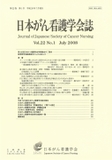Japanese
English
- 販売していません
- Abstract 文献概要
- 参考文献 Reference
- サイト内被引用 Cited by
要旨
本研究の目的は在宅で終末期がん患者を介護した家族の体験を明らかにすることである.対象は訪問看護を受けながら終末期がん患者を在宅介護した家族員(遺族)15名(13家族)で,半構造化面接を実施し,面接内容を逐語訳し質的帰納的に分析した.分析の結果,在宅で終末期がん患者を介護した家族の体験は【無力さを感じる】【医療・保険制度に不満と怒りを感じる】【介護者自身の心身の安定を求める】【介護の主体者であることを自負する】【専門職者とのつながりを支えに頑張る】【患者に死期が迫りつつあることを意識し苦悩する】【介護に奮闘する】【患者の状況に気持ちがゆれる】【在宅介護の良さも困難さも実感する】【介護の力を高める】【家族成員間のつながりを再認識する】【新しい家族の姿を模索する】の12に集約された.明らかにされた12の体験には,以下の4つの特徴があることがわかった.すなわち“患者の死の過程に向き合い苦悩しながら生存と安楽を願う”,“介護を担う重責を感じ学習し介護の力をつけていく”,“医療職者との密接なつながりと専門職者間の連携を支えとし在宅介護を継続する”,“在宅介護がもたらす家族関係の変化と新たな家族の課題に対処する”.考察を通じて,家族が主体的にがん患者の介護を学ぶ力をもち,家族の新しい課題に対処しようとしていることが示唆された.
Abstract
The purpose of this study was to elucidate the experiences of family members who cared for end-stage cancer patients at home. The participants were 15 bereaved family members(from 13 families), who had cared for end-stage cancer patients at home while receiving support from visiting nursing services. Semi-structured interviews were conducted with the participating family members, and their answers were transcribed word for word and analyzed qualitatively.
The following 12 typical experiences were identified during the analysis: feelings of helplessness; dissatisfaction with and indignation over health-care and insurance systems; demands for ensuring mental and physical stability of the caregivers themselves; awareness of their identity as primary caregivers; making efforts with the support of their relationships with healthcare professionals; heartache from recollection that the patients were confronted with their upcoming death; efforts and struggles in providing domiciliary care; embarrassment with the patients' states; realizing merits and demerits of home-care; trying to improve their own skills in care provision; recognition anew of the relationship between family members; groping for the future status of their family. Considering the nature of the 12 experiences identified above, we elicited the following 4 features:(i)they wished for the patients' survival and comfort even as they struggled with the dying process;(ii)they tried to learn and acquire care skills after feeling the heavy responsibility of caring for others;(iii)they tried to continue in-home care by relying on a close relationship with healthcare professionals and cooperation among specialists; and(iv) they dealt with changes in family relationships and new family-related challenges brought on by the in-home care.
It was evident throughout the discussion that the family members had the potential to actively acquire the skills needed to care for cancer patients, and to deal with new family-related challenges.
Copyright © 2008, Japanese Society of Cancer Nursing All rights reserved.


